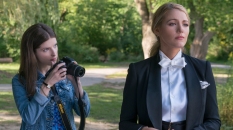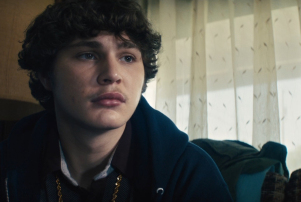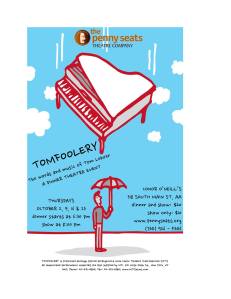
- [Image Source: Wikipedia]
We wear the mask that grins and lies,
It hides our cheeks and shades our eyes,—
This debt we pay to human guile;
With torn and bleeding hearts we smile,
And mouth with myriad subtleties.
– “We Wear the Mask,” Paul Laurence Dunbar
“Secrets are like margarine. Easy to spread but bad for the heart.” – Stephanie Smothers (Anna Kendrick), A Simple Favor
“What can I say? I’m a glass-half-full kind of guy.” – Rick Wershe, Sr. (Matthew McConaughey), White Boy Rick

[Image Source: Wikipedia]
A Simple Favor is stylishly directed by Paul Feig, whose previous efforts Bridesmaids, The Heat, Ghostbusters, and Spy demonstrated a sure-handed understanding that women are, you know, people too. Based on a novel by Darcey Bell (think Postman Always Rings Twice author James M. Cain writing for The CW), Feig gleefully pulls a Brian DePalma (minus the gory misogyny) in an unrelenting homage to some of suspense cinema’s greatest hits: Vertigo, Charade, Diabolique (actually name-checked by one of the characters), Gaslight, and, yes, Cain’s Double Indemnity, and probably a dozen more I’m forgetting. Blessedly, Feig embraces the black comedy of it all, and the film is less Paul Verhoeven’s Basic Instinct and more Mel Brooks-spoofs-Gone Girl.

[Image Source: Wikipedia]

[Image Source: Wikipedia]
Emily and Stephanie meet cute in the rain, picking their sons up from school, and strike up the unlikeliest of friendships. The best parts of the movie are watching these two circle each other, realizing their respective “hustles” are as artificial as the day is long. Pretty soon, Emily disappears Gone Girl-style, and hunky husband Sean Townsend (Crazy Rich Asians‘ Henry Golding who is suddenly everywhere) is the chief culprit, which is compounded when he and Stephanie strike up a romance.

[Image Source: Wikipedia]
Across the aisle from A Simple Favor‘s flawless Dwell Magazine production design is the rough and tumble scruffiness of White Boy Rick, set in the nadir of Mayor Coleman Young’s mid-80s Detroit when the entire city looked like the back lot of a Mad Max movie and stopping to grab a Slurpee at 7-Eleven was a death-defying act.

[Image Source: Wikipedia]

[Image Source: Wikipedia]
Director Yann Demange does an exceptional job capturing the sheer ugliness of this hardscrabble place and time without ever condescending to the moment nor its denizens. These characters are people who view the “land of opportunity” through a fun-house mirror where the only choices for financial stability are felonious. I will admit that I found the film’s point-of-view regarding its central figure problematically slippery. Are we to sympathize with him and his failings? Is he some kind of martyr figure? What does the film mean to imply about race in these circumstances? I’m at sea about the answers to these questions, and that leaves me just shy of fully supporting the film. White Boy Rick is well-done with a crackerjack cast, but I walk away with a bit of unease about what it is ultimately trying to say about race and class distinctions in America.

[Image Source: Wikipedia]
Why should the world be over-wise,
In counting all our tears and sighs?
Nay, let them only see us, while
We wear the mask.
We smile, but, O great Christ, our cries
To thee from tortured souls arise.
We sing, but oh the clay is vile
Beneath our feet, and long the mile;
But let the world dream otherwise,
We wear the mask!
– “We Wear the Mask,” Paul Laurence Dunbar
______________________________
Reel Roy Reviews is now TWO books! You can purchase your copies by clicking here (print and digital). In addition to online ordering at Amazon or from the publisher Open Books, the first book is currently is being carried by Bookbound, Common Language Bookstore, and Crazy Wisdom Bookstore and Tea Room in Ann Arbor, Michigan and by Green Brain Comics in Dearborn, Michigan. My mom Susie Duncan Sexton’s Secrets of an Old Typewriter series is also available on Amazon and at Bookbound and Common Language.

![Description: Film poster; Source: Wikipedia [linked]; Portion used: Film poster only; Low resolution? Sufficient resolution for illustration, but considerably lower resolution than original. Other information: Intellectual property by film studio. Non-free media use rationales: Non-free media use rationale - Article/review; Purpose of use: Used for purposes of critical commentary and illustration in an educational article about the film. The poster is used as the primary means of visual identification of this article topic. Replaceable? Protected by copyright, therefore a free use alternative won't exist.](https://reelroyreviews.files.wordpress.com/2014/10/gone-girl.jpg?w=202&h=300)
